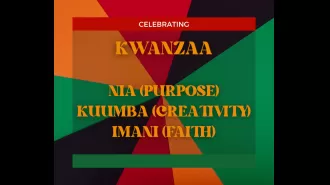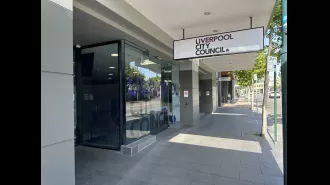Fighting for Black children in care, tackling a pressing issue.
Rachel Cole's network has many individuals who desire to be foster parents but were hesitant about the steps involved.
May 26th 2024.

Rachel Cole had always wanted to make a positive impact on the lives of children. So when she turned 29, she decided to become a single foster carer. However, she soon realized that there was more she could do to help these vulnerable kids than just providing them with a home. Drawing from her own experiences, she came up with a unique way to support them.
In 2015, Rachel welcomed a 13-year-old boy into her home, and he stayed with her until he turned 21. It was an incredibly fulfilling experience for both of them. Rachel fondly recalls, "The young man I had in my care at the time flourished. It was amazing to see." She had received a brief overview of the child before he came into her care, but it wasn't until they had a conversation that she truly understood his struggles. He had been in and out of foster homes and felt like he always had to explain and justify his situation. With Rachel, who is also Black, he didn't feel the need to constantly share that he was a foster child. This made a profound impact on him.
Sadly, Rachel's experience is not uncommon. According to the Foster Network, there is a disproportionate number of Black children and young people in care, and the shortage of Black foster carers is a major issue. Shocking statistics from a 2023 Ofsted report show that there are more foster carers leaving the role than there are new ones joining. This is not because Black families don't want to open their homes, as Rachel discovered when she told people about her own experience as a Black foster carer.
However, many Black families face barriers when trying to become foster carers. Rachel explains, "A lot of people in the community told me they wanted to become foster carers, however one of the challenges they faced was they didn't know how to do it or they started the process and left because they felt it was really oppressive. For me, that was very disappointing." That is why she founded the Black Foster Carers Alliance this year. It is an organization dedicated to promoting diversity, inclusion, and equity in the fostering sector. Their goal is to empower minority families to become foster carers and work with organizations to improve their recruitment and retention of foster carers. They also support families who are not Black but are caring for Black children.
One of the key points of the BFCA is to prioritize cultural competence and diversity awareness. Rachel has a unique perspective on the challenges and opportunities within the fostering sector, having previously worked as the operations director of Fostertalk, a leading support and membership service for over 20,000 foster carers in the UK. She understands the difficulties faced by Black foster carers and those who try to join the system.
Rachel explains that the fostering process can be intrusive, as social workers ask personal questions about family background, upbringing, and finances. This can be overwhelming for many people. She adds, "There was a lot of judgment in terms of their homes and finances. Why things looked a certain way or were in a certain place, why particular things looked a particular way, and the amount of stuff in the home. The theme of hoarding always comes up."
Rachel is determined to encourage more Black families to consider fostering. She also wants to address the lack of cultural understanding and sensitivity in the process. For instance, she mentions how one foster carer was questioned for financially supporting their elderly mother. This lack of nuance and cultural awareness can be off-putting for many prospective foster carers and has caused some to drop out of the process.
In conclusion, Rachel's personal experiences as a foster carer have inspired her to create positive change in the fostering sector. Through the Black Foster Carers Alliance, she aims to empower minority families to become foster carers and improve the system's cultural competence and diversity awareness. She hopes that more Black families will be encouraged to open their homes to vulnerable children, and that the fostering process will become more inclusive and understanding.
Rachel Cole was only 29 years old when she made the decision to become a single foster carer. As someone who had grown up in the foster care system, she knew firsthand the struggles and challenges that these children faced. But she also knew that there was a way she could make a difference and help these children who often felt voiceless and alone.
In 2015, Rachel welcomed a 13-year-old boy into her home and he ended up staying with her until he turned 21. It was an incredibly rewarding experience for both of them. Rachel recalls, "The young man I had in my care at the time flourished. It was amazing to see." This experience only strengthened Rachel's belief that she was meant to be a foster carer.
One of the things that stood out to Rachel when she first received her foster carer placement was the lack of information she was given about the child. She explains, "When you're given a foster carer placement, you're just given a piece of paper with an overview of a child – and the overview that I got was he's never in the house, he leaves at 7am and gets back at 7pm and he runs away a lot." But Rachel didn't let this discourage her, instead she took the time to have a conversation with the boy and discovered that one of the reasons he didn't like his previous foster placement was because he always felt the need to explain that he was a foster child. With Rachel, who is also Black, he didn't have to do this. "He felt he didn't always have to share that he was a foster child and that was really poignant," Rachel shares.
Unfortunately, the UK's leading foster charity, The Foster Network, reports that there is an overrepresentation of Black children and young people in care, and there is a significant shortage of Black foster carers. Shocking statistics from 2023 Ofsted show that there are more foster carers leaving the role than there are new joiners. Rachel believes that this is not because Black families do not want to become foster carers, but because they face challenges and barriers in the process.
"A lot of people were really interested when I told them I was a Black foster carer," Rachel says. "A lot of people in the community told me they wanted to become foster carers, however one of the challenges they faced was they didn't know how to do it or they started the process and left because they felt it was really oppressive. For me, that was very disappointing." This is why Rachel decided to start the Black Foster Carers Alliance this year. It's an organization dedicated to promoting diversity, inclusion, and equity in the fostering sector, with the goal of empowering minority families to become foster carers and supporting non-Black families who are caring for Black children.
One of the main focuses of the BFCA is to prioritize cultural competence and diversity awareness in the fostering community. Rachel, who previously worked as the operations director for Fostertalk, a support and membership service for over 20,000 foster carers in the UK, brings a unique perspective to the challenges and opportunities within the fostering sector.
Within her network of Black foster carers and those who have tried to join the process, there is a common feeling that they are being judged more harshly than others. "Fostering is an intrusive process," Rachel explains. "You are asked about your family background, your upbringing, and your finances are reviewed. A lot of people find that difficult."
Prospective foster families are assigned a social worker who visits their home multiple times over a period of three to six months. Rachel notes that there is often a lot of judgement during these visits, particularly regarding the appearance of the home and the family's finances. She says, "Why things looked a certain way or were in a certain place, why particular things look a particular way, and the amount of stuff in the home. The theme of hoarding always comes up."
Rachel wants to encourage more Black families to consider becoming foster carers, but she acknowledges that there is a lack of nuance and cultural understanding in the process. She shares the story of a foster carer who was questioned by social workers for financially supporting her mother by paying a bill on her behalf. "The fostering service asked her, 'Why are you doing this? Are you getting the money back?' and it was a big problem. It put her off the whole process. That's something that happens in our culture in terms of helping the elderly financially."
In 2015, Rachel welcomed a 13-year-old boy into her home, and he stayed with her until he turned 21. It was an incredibly fulfilling experience for both of them. Rachel fondly recalls, "The young man I had in my care at the time flourished. It was amazing to see." She had received a brief overview of the child before he came into her care, but it wasn't until they had a conversation that she truly understood his struggles. He had been in and out of foster homes and felt like he always had to explain and justify his situation. With Rachel, who is also Black, he didn't feel the need to constantly share that he was a foster child. This made a profound impact on him.
Sadly, Rachel's experience is not uncommon. According to the Foster Network, there is a disproportionate number of Black children and young people in care, and the shortage of Black foster carers is a major issue. Shocking statistics from a 2023 Ofsted report show that there are more foster carers leaving the role than there are new ones joining. This is not because Black families don't want to open their homes, as Rachel discovered when she told people about her own experience as a Black foster carer.
However, many Black families face barriers when trying to become foster carers. Rachel explains, "A lot of people in the community told me they wanted to become foster carers, however one of the challenges they faced was they didn't know how to do it or they started the process and left because they felt it was really oppressive. For me, that was very disappointing." That is why she founded the Black Foster Carers Alliance this year. It is an organization dedicated to promoting diversity, inclusion, and equity in the fostering sector. Their goal is to empower minority families to become foster carers and work with organizations to improve their recruitment and retention of foster carers. They also support families who are not Black but are caring for Black children.
One of the key points of the BFCA is to prioritize cultural competence and diversity awareness. Rachel has a unique perspective on the challenges and opportunities within the fostering sector, having previously worked as the operations director of Fostertalk, a leading support and membership service for over 20,000 foster carers in the UK. She understands the difficulties faced by Black foster carers and those who try to join the system.
Rachel explains that the fostering process can be intrusive, as social workers ask personal questions about family background, upbringing, and finances. This can be overwhelming for many people. She adds, "There was a lot of judgment in terms of their homes and finances. Why things looked a certain way or were in a certain place, why particular things looked a particular way, and the amount of stuff in the home. The theme of hoarding always comes up."
Rachel is determined to encourage more Black families to consider fostering. She also wants to address the lack of cultural understanding and sensitivity in the process. For instance, she mentions how one foster carer was questioned for financially supporting their elderly mother. This lack of nuance and cultural awareness can be off-putting for many prospective foster carers and has caused some to drop out of the process.
In conclusion, Rachel's personal experiences as a foster carer have inspired her to create positive change in the fostering sector. Through the Black Foster Carers Alliance, she aims to empower minority families to become foster carers and improve the system's cultural competence and diversity awareness. She hopes that more Black families will be encouraged to open their homes to vulnerable children, and that the fostering process will become more inclusive and understanding.
Rachel Cole was only 29 years old when she made the decision to become a single foster carer. As someone who had grown up in the foster care system, she knew firsthand the struggles and challenges that these children faced. But she also knew that there was a way she could make a difference and help these children who often felt voiceless and alone.
In 2015, Rachel welcomed a 13-year-old boy into her home and he ended up staying with her until he turned 21. It was an incredibly rewarding experience for both of them. Rachel recalls, "The young man I had in my care at the time flourished. It was amazing to see." This experience only strengthened Rachel's belief that she was meant to be a foster carer.
One of the things that stood out to Rachel when she first received her foster carer placement was the lack of information she was given about the child. She explains, "When you're given a foster carer placement, you're just given a piece of paper with an overview of a child – and the overview that I got was he's never in the house, he leaves at 7am and gets back at 7pm and he runs away a lot." But Rachel didn't let this discourage her, instead she took the time to have a conversation with the boy and discovered that one of the reasons he didn't like his previous foster placement was because he always felt the need to explain that he was a foster child. With Rachel, who is also Black, he didn't have to do this. "He felt he didn't always have to share that he was a foster child and that was really poignant," Rachel shares.
Unfortunately, the UK's leading foster charity, The Foster Network, reports that there is an overrepresentation of Black children and young people in care, and there is a significant shortage of Black foster carers. Shocking statistics from 2023 Ofsted show that there are more foster carers leaving the role than there are new joiners. Rachel believes that this is not because Black families do not want to become foster carers, but because they face challenges and barriers in the process.
"A lot of people were really interested when I told them I was a Black foster carer," Rachel says. "A lot of people in the community told me they wanted to become foster carers, however one of the challenges they faced was they didn't know how to do it or they started the process and left because they felt it was really oppressive. For me, that was very disappointing." This is why Rachel decided to start the Black Foster Carers Alliance this year. It's an organization dedicated to promoting diversity, inclusion, and equity in the fostering sector, with the goal of empowering minority families to become foster carers and supporting non-Black families who are caring for Black children.
One of the main focuses of the BFCA is to prioritize cultural competence and diversity awareness in the fostering community. Rachel, who previously worked as the operations director for Fostertalk, a support and membership service for over 20,000 foster carers in the UK, brings a unique perspective to the challenges and opportunities within the fostering sector.
Within her network of Black foster carers and those who have tried to join the process, there is a common feeling that they are being judged more harshly than others. "Fostering is an intrusive process," Rachel explains. "You are asked about your family background, your upbringing, and your finances are reviewed. A lot of people find that difficult."
Prospective foster families are assigned a social worker who visits their home multiple times over a period of three to six months. Rachel notes that there is often a lot of judgement during these visits, particularly regarding the appearance of the home and the family's finances. She says, "Why things looked a certain way or were in a certain place, why particular things look a particular way, and the amount of stuff in the home. The theme of hoarding always comes up."
Rachel wants to encourage more Black families to consider becoming foster carers, but she acknowledges that there is a lack of nuance and cultural understanding in the process. She shares the story of a foster carer who was questioned by social workers for financially supporting her mother by paying a bill on her behalf. "The fostering service asked her, 'Why are you doing this? Are you getting the money back?' and it was a big problem. It put her off the whole process. That's something that happens in our culture in terms of helping the elderly financially."
[This article has been trending online recently and has been generated with AI. Your feed is customized.]
[Generative AI is experimental.]
0
0
Submit Comment





